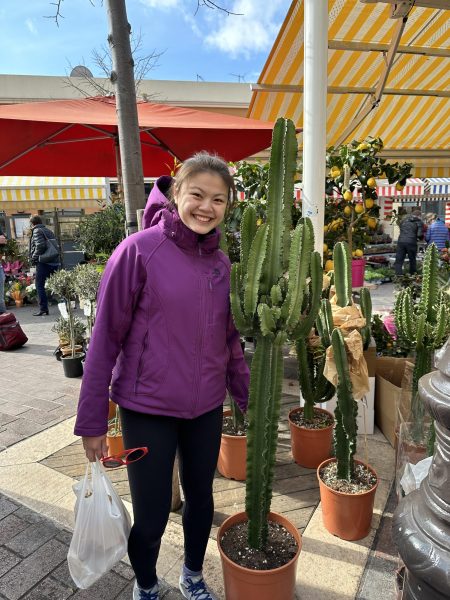On Thursday, October 13, 2022, amid the stresses of midterm week, a group of boisterous Carleton students boarded a dilapidated yellow school bus bound for Minneapolis’ Guthrie Theater to see its Mina Morita-directed production of “Vietgone.” There were a variety of reasons for seeing this play. For many, viewing the production was a requirement of their A&I courses. Members of Carleton’s Viet Club were also in attendance, along with other students who went for fun. The experience was organized by Dr. Pierre Hecker, Professor of English, who teaches the A&I course “Drama, Film, and Society.”
The playwright of “Vietgone,” Qui Nguyen, is also a film writer and co-founder of the Obie Award winning “Vampire Cowboys” Theatre Company in New York City. Nguyen’s regular incorporation of pop culture has yielded widely-known plays such as “She Kills Monsters,” screenplays such as Disney’s “Raya and the Last Dragon,” and upcoming works like Disney’s “Strange World.”
We learn over the course of the play that “Vietgone” is actually the love story of Nguyen’s own parents. After the fall of Saigon, two Vietnam war refugees — Quang and Tong — wind up at a refugee camp in Fort Chaffee, Arkansas, where they fall in love under unforeseen circumstances and in unfamiliar lands. The characters grapple with the question of “what is home?” as they navigate a foreign country and their uncertain futures. “Vietgone” is performed as a series of flashbacks, heedless of chronology, that depicts a story taking place in the midst of the Vietnam War. “Vietgone,” however, is not a story about fighting and conflict, “it is a story about falling in love,” says the actor portraying Nguyen, before the play begins.
A love and war comedy packed with pop culture references, rap music and witty banter,
“Vietgone” flips the traditionally somber “war story” upside down by telling it with a flair of almost comic modernity. “I thought the comedy was really effective and did not take away from the larger message of the show because it challenges dominant narratives about the war,” commented Dr. Andrew Carlson ‘99, a Carleton theater professor who teaches the A&I course “The Power of Story” which required that students saw the production. “The genre and language usually used in stories about the Vietnam War are tragic and predominantly about loss. And these often white-authored stories about the Vietnamese experience make an object of those characters.” Comparatively, “Vietgone” openly challenges stereotypes.
Larger questions about race, identity and humanity are woven into the plot of the play. “What stories do we tell about the Vietnam War, and how are they shaped by who is telling them? How do people connect and ultimately fall in love in extraordinary, painful circumstances? How do we represent language on stage as it relates to race and ethnicity? How do we remember? What role does memory play in the stories that we tell ourselves and the stories that we tell each other?” questioned Dr. Carlson, who later asked his class some of these questions in a discussion.
Dr. Carlson considers the aforementioned class discussion as a success. “I thought that the production was really successful as a way of having the conversations that we were trying to have in class – about the impact of story on society and also the ways in which theater communicates uniquely as a form…The many different, boldly theatrical choices they made really suited the conversation we were trying to have,” he said. Over the past few weeks, the class had been focusing on the different vessels for storytelling. From Aristotelian plot structure of Greek tragedy to the dramatic design choices in the highly decorated film “Parasite,” the class had been analyzing the many ways that artists use formal and structural elements pertinent to theater, film, text, and audio to tell stories.
The play was a success in many different ways. Dr. Carlson later recounted, “I felt like the conversation we had as a class really was able to think through the different interpretations of character and of themes, and of ideas to make some important arguments about how theater was working and about how identity was being performed on stage, particularly with issues of race and casting that came up in class.”
In the final scene, there is a jump in time where the original protagonist is now an elderly man. His son, the playwright, asks him questions about his experience in the Vietnam War. “I am more than just Vietnam,” the father says to his son. “Just stick to writing your funny plays.” The man the audience had just watched dance around the stage as a young man had now grown into an old father being reluctantly interviewed by his son for a play. Between jokes about the father’s own unsuccessful attempts at changing his son’s soiled diaper and the difficult questions about reliving his past, there is a broad range of emotion displayed in just one second.
The emotion that the audience felt was palpable, as they leaned forward and sat on the edge of their seats. Dr. Carlson offered some insight: “I felt like the performers made the choice to go really deep [in that final scene]. I think there’s a way of doing that scene that yes, is about something that is still in the same genre of comedy that the rest of the play is in. But I almost felt like it shifted genre a little bit at the end where there is this very comedic play that has these different moments of depth and seriousness… They didn’t play it for laughs; they didn’t play it at the same level as everything else. And I was surprised at how moved I was by it.” While Dr. Carlson didn’t expect to be as moved as he was by that scene, it nevertheless was quite powerful in telling the story of a playwright exploring his family history which we assume was the inspiration for the writing of this play.
In this reversal of roles of the strong, eloquent protagonist becoming an elderly father, the reversal of the prologue at the end of the play, our perceptions of the play are completely reversed by the raw humanity behind this comedic production.
Ultimately, as captivating as the production of “Vietgone” was, the most magical moment of the night might not have been one sitting in a plush chair under the dimmed lights at the renowned Guthrie Theater, but a moment shared with each other outside. “There was something about seeing all of the students from different classes together for the first time at this play that we were all going to have together. Of course the production is important, but there was something about arriving beforehand that was really special,” said Dr. Carlson. In the end, the play served not only to tell the story of its characters, but also to bring people together from all different groups to share that story.













